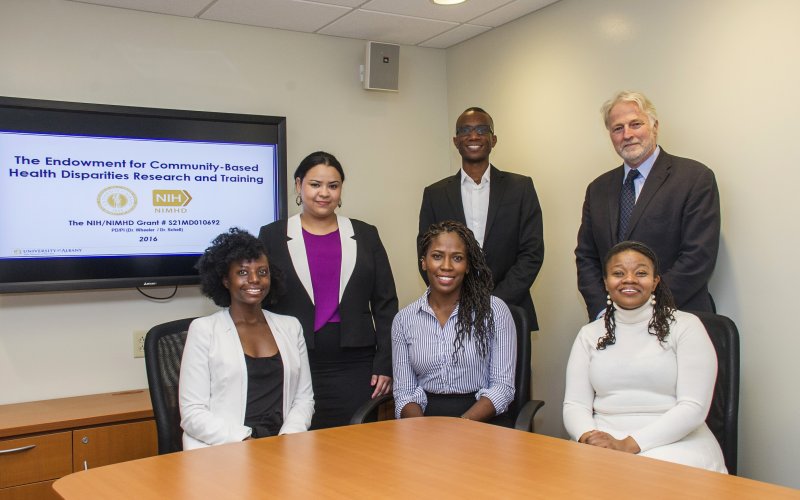President's Forum on Health Disparities Draws Hundreds

ALBANY, N.Y. (May 18, 2021) – The annual President’s Forum on Health Disparities on April 30 brought together more than 300 community members all focused on a common goal: ending minority health disparities.
Hosted by the Center for Elimination of Minority Health Disparities (CEMHD), Upstate Medical University and SUNY Downstate Health Sciences University, the forum is a centerpiece of the University’s $10 million National Institutes of Health grant, awarded in 2016 to increase, improve and accelerate training of doctoral students and faculty in health disparities research.
President Rodríguez opened the forum, noting there has never been a more critical or timely moment to address the topic.
“Many of us have been talking about health disparities and health equity for a very long time. However, the pandemic has helped shine a light on the terrible toll that health disparities takes on marginalized, disadvantaged minority communities,” he said, “To say that COVID-19 has caused massive loss and upheaval in our communities would truly be an understatement. But it has also generated a new level of awareness of the institutionalized racism, discrimination and poverty that are at the root of health disparities.”
Rodríguez also stressed that simply studying the problem is not enough. “It is significant that the name of CEMHD includes the word ‘elimination.’ That’s a powerful message and signals that it is not enough to just study this problem — we simply need to do away with it.”
One group that especially sees the value in events like the forum are the Presidential Doctoral Fellows at CEMHD – currently a group of 11 who are receiving transdisciplinary training in health disparities while studying in doctoral programs ranging from anthropology, psychology, public health and criminal justice.
“Events like the forum are critical in educating people and generating accessible and candid conversations about minority health disparities,” said Justin Clayton, a PhD student in the School of Criminal Justice and current fellow at CEMHD. “Unfortunately, I think it is reasonable to presume most people are simply unaware of the extent to which these differences in health and healthcare treatment exist. At UAlbany, we have some fantastic scholars producing cutting-edge research, and the forum provides an incredible medium for them to disseminate their findings and engage with others about the policy implications of their work.”
Another reason why the forum is so valuable, according to Clayton, is because it brings distinguished external experts to campus, such as keynote speaker Thomas LaVeist, dean at Tulane University’s School of Public Health and Tropical Medicine and a renowned expert in equity and health issues.
“It's such a privilege to be able to network with someone as accomplished and sincere as Dean LaVeist,” said Clayton. “As aspiring scholars, the Presidential fellows were ecstatic to hear his thoughts on producing high-impact research, establishing and maintaining genuine professional relationships, and navigating our careers as we move from graduate students to professors. Since the fellows’ meeting with Dean LaVeist, I’ve been actively looking for opportunities to implement the advice he gave us into my own graduate student experience.”
"As a student in Counseling Psychology, it is great to be able to network with professionals in other fields,” added Katheryn Roberson, a PhD candidate. “The need for interdisciplinary work to reduce health disparities is clear, and getting to meet Dr. LaVeist was a highlight of the semester. He provided insight into how to make large level changes to reduce health disparities as well as ways in which to communicate the need for equity in a manner that is clear and direct. I think connecting with professionals across fields encourages people to look at problems from different angles."
Additional fellows include:
- Kaydian Reid, School of Public Health
- Melissa Noel, School of Criminal Justice
- Wayne Lawrence, School of Public Health
- Yajaira Cabrera Tineo, College of Arts & Sciences
- Erica Tyler, College of Arts & Sciences
- Hnin Wai Lwin Myo, School of Public Health
- Ola Kalu, College of Arts and Sciences
- Simone Seward, School of Public Health
- Guillermo Escano, PhD student, School of Criminal Justice
- Alexis Chamorro-Ortiz, College of Arts & Sciences
- Jazmin High, College of Arts & Sciences
- Rosie Love, School of Social Welfare
Biographies for the fellows are available on the CEMHD website.




